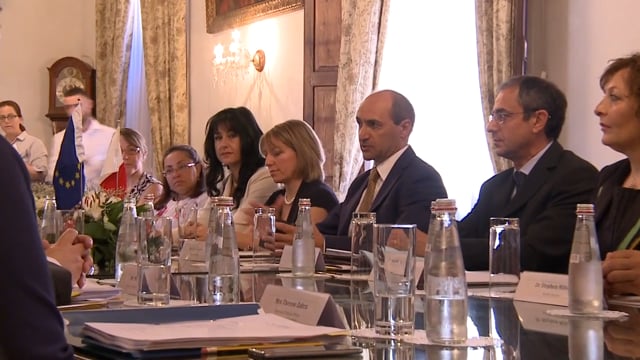[WATCH] Malta's EU presidency priorities to include child obesity and HIV
Childhood obesity, HIV and cross border cooperation priorities of Malta’ presidency of the EU council


Health minister Chris Fearne and EU health and food safety commissioner Vytenis Andriukatis said they are looking forward to Malta’s presidency of the EU council in January 2017, during a meeting held earlier today at the health ministry.
Fearne said that the country’s priorities while in the driving seat would include childhood obesity, an issue affecting all member states and Malta in particular according to recent studies.
“Controlling the calories ingested by Maltese citizens requires a European discussion especially since most of our food is imported,” Fearne added.
He explained that Malta would be proposing voluntary procurement guidelines to create a market for healthier foods available on the market.
“This is the next step following the council’s efforts to encourage producers and manufacturers to reduce elements like salt, sugar and calories from foods sold,” Fearne said, adding that the guidelines would inform buyers about the healthier options out there.
He added that other sectors to be emphasised included diabetes and its association to body mass index among others.
Fearne said that another priority will be cross-border cooperation, to allow Malta access to the most specialised centres of excellence despite our small size and arguably limited resources.
“Our citizens can have a disadvantage in terms of high end specialised care from centres of excellence,” he said adding that bilateral agreements over time had meant specialised care for Maltese citizens.
The third theme to be tackled is HIV, with Europe having one of the highest growth rates of the illness, and the disease changing over time.
Andriukatis pointed out that he was very pleased with the programme presented by Malta as it stresses continuity from previous EU council programmes.
He added that he hoped that health became more “visible” on a European level to ensure that health initiatives received the funding and importance they deserved.
“Health must be more visible at European level,” he said, adding that the sector ought to be in all priority lists for the union to understand country specific realities.
He also stressed that the EU must continue to strive to challenge misconceptions that it was not efficient or practical, by pushing for efficient measures.
Fearne also added that Malta would be hosting a number of conferences and workshops under the E-health week in May 2017.
“The events aim to attract around 2,000 delegates from EU member states, and they are meant to share best practices and the latest research about the effective use of technology in the health sector,” Fearne said.






.jpg)
















